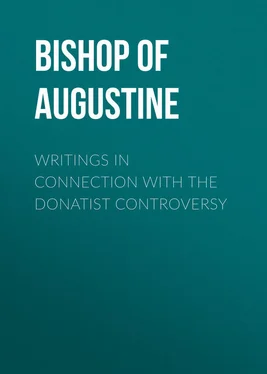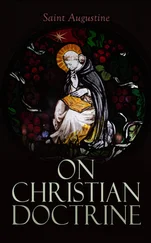Saint Augustine - Writings in Connection with the Donatist Controversy
Здесь есть возможность читать онлайн «Saint Augustine - Writings in Connection with the Donatist Controversy» — ознакомительный отрывок электронной книги совершенно бесплатно, а после прочтения отрывка купить полную версию. В некоторых случаях можно слушать аудио, скачать через торрент в формате fb2 и присутствует краткое содержание. Жанр: foreign_antique, foreign_prose, на английском языке. Описание произведения, (предисловие) а так же отзывы посетителей доступны на портале библиотеки ЛибКат.
- Название:Writings in Connection with the Donatist Controversy
- Автор:
- Жанр:
- Год:неизвестен
- ISBN:нет данных
- Рейтинг книги:3 / 5. Голосов: 1
-
Избранное:Добавить в избранное
- Отзывы:
-
Ваша оценка:
- 60
- 1
- 2
- 3
- 4
- 5
Writings in Connection with the Donatist Controversy: краткое содержание, описание и аннотация
Предлагаем к чтению аннотацию, описание, краткое содержание или предисловие (зависит от того, что написал сам автор книги «Writings in Connection with the Donatist Controversy»). Если вы не нашли необходимую информацию о книге — напишите в комментариях, мы постараемся отыскать её.
Writings in Connection with the Donatist Controversy — читать онлайн ознакомительный отрывок
Ниже представлен текст книги, разбитый по страницам. Система сохранения места последней прочитанной страницы, позволяет с удобством читать онлайн бесплатно книгу «Writings in Connection with the Donatist Controversy», без необходимости каждый раз заново искать на чём Вы остановились. Поставьте закладку, и сможете в любой момент перейти на страницу, на которой закончили чтение.
Интервал:
Закладка:
Chap. XIX. – 29. But that I may not seem to be uttering these praises of the blessed martyr (which, indeed, are not his, but rather those of Him by whose grace he showed himself what he was), in order to escape the burden of proof, let us now bring forward from his letters the testimony by which the mouths of the Donatists may most of all be stopped. For they advance his authority before the unlearned, to show that in a manner they do well when they baptize afresh the faithful who come to them. Too wretched are they – and, unless they correct themselves, even by themselves are they utterly condemned – who choose in the example set them by so great a man to imitate just that fault, which only did not injure him, because he walked with constant steps even to the end in that from which they have strayed who "have not known the ways of peace." 61 61 Rom. iii. 17; from which it has been introduced into the Alexandrine MS. of the Septuagint at Ps. xiv. 3, as it is quoted by Migne, and found in the English Prayer-book version of the Psalms.
It is true that Christ's baptism is holy; and although it may exist among heretics or schismatics, yet it does not belong to the heresy or schism; and therefore even those who come from thence to the Catholic Church herself ought not to be baptized afresh. Yet to err on this point is one thing; it is another thing that those who are straying from the peace of the Church, and have fallen headlong into the pit of schism, should go on to decide that any who join them ought to be baptized again. For the former is a speck on the brightness of a holy soul which abundance of charity 62 62 Charitatis ubera.
would fain have covered; the latter is a stain in their nether foulness which the hatred of peace in their countenance ostentatiously brings to light. But the subject for our further consideration, relating to the authority of the blessed Cyprian, we will commence from a fresh beginning.
BOOK SECOND
IN WHICH AUGUSTINE PROVES THAT IT IS TO NO PURPOSE THAT THE DONATISTS BRING FORWARD THE AUTHORITY OF CYPRIAN, BISHOP AND MARTYR, SINCE IT IS REALLY MORE OPPOSED TO THEM THAN TO THE CATHOLICS. FOR THAT HE HELD THAT THE VIEW OF HIS PREDECESSOR AGRIPPINUS, ON THE SUBJECT OF BAPTIZING HERETICS IN THE CATHOLIC CHURCH WHEN THEY JOIN ITS COMMUNION, SHOULD ONLY BE RECEIVED ON CONDITION THAT PEACE SHOULD BE MAINTAINED WITH THOSE WHO ENTERTAINED THE OPPOSITE VIEW, AND THAT THE UNITY OF THE CHURCH SHOULD NEVER BE BROKEN BY ANY KIND OF SCHISM.
CHAP. I. – 1. How much the arguments make for us, that is, for catholic peace, which the party of Donatus profess to bring forward against us from the authority of the blessed Cyprian, and how much they prove against those who bring them forward, it is my intention, with the help of God, to show in the ensuing book. If, therefore, in the course of my argument, I am obliged to repeat what I have already said in other treatises (although I will do so as little as I can), yet this ought not to be objected to by those who have already read them and agree with them; since it is not only right that those things which are necessary for instruction should be frequently instilled into men of dull intelligence, but even in the case of those who are endowed with larger understanding, it contributes very much both to make their learning easier and their powers of teaching readier, where the same points are handled and discussed in many various ways. For I know how much it discourages a reader, when he comes upon any knotty question in the book which he has in hand, to find himself presently referred for its solution to another which he happens not to have. Wherefore, if I am compelled, by the urgency of the present questions, to repeat what I have already said in other books, I would seek forgiveness from those who know those books already, that those who are ignorant may have their difficulties removed; for it is better to give to one who has already, than to abstain from satisfying any one who is in want.
2. What, then, do they venture to say, when their mouth is closed 63 63 Præfocantur.
by the force of truth, with which they will not agree? "Cyprian," say they, "whose great merits and vast learning we all know, decreed in a Council, 64 64 The Council of Carthage, September 1, A.D. 256, in which eighty-seven African bishops declared in favour of rebaptizing heretics. The opinions of the bishops are quoted and answered by Augustine, one by one, in Books vi. and vii.
with many of his fellow-bishops contributing their several opinions, that all heretics and schismatics, that is, all who are severed from the communion of the one Church, are without baptism; and therefore, whosoever has joined the communion of the Church after being baptized by them must be baptized in the Church." The authority of Cyprian does not alarm me, because I am reassured by his humility. We know, indeed, the great merit of the bishop and martyr Cyprian; but is it in any way greater than that of the apostle and martyr Peter, of whom the said Cyprian speaks as follows in his epistle to Quintus? "For neither did Peter, whom the Lord chose first, and on whom He built His Church, 65 65 Matt. xvi. 18.
when Paul afterwards disputed with him about circumcision, claim or assume anything insolently and arrogantly to himself, so as to say that he held the primacy, and should rather be obeyed of those who were late and newly come. Nor did he despise Paul because he had before been a persecutor of the Church, but he admitted the counsel of truth, and readily assented to the legitimate grounds which Paul maintained; giving us thereby a pattern of concord and patience, that we should not pertinaciously love our own opinions, but should rather account as our own any true and rightful suggestions of our brethren and colleagues for the common health and weal." 66 66 Cypr. Ep. lxxi.
Here is a passage in which Cyprian records what we also learn in holy Scripture, that the Apostle Peter, in whom the primacy of the apostles shines with such exceeding grace, was corrected by the later Apostle Paul, when he adopted a custom in the matter of circumcision at variance with the demands of truth. If it was therefore possible for Peter in some point to walk not uprightly according to the truth of the gospel, so as to compel the Gentiles to judaize, as Paul writes in that epistle in which he calls God to witness that he does not lie; for he says, "Now the things which I write unto you, behold, before God, I lie not;" 67 67 Gal. i. 20.
and, after this sacred and awful calling of God to witness, he told the whole tale, saying in the course of it, "But when I saw that they walked not uprightly, according to the truth of the gospel, I said unto Peter before them all, If thou, being a Jew, livest after the manner of the Gentiles, and not as do the Jews, why compellest thou the Gentiles to live as do the Jews?" 68 68 Gal. ii. 14.
– if Peter, I say, could compel the Gentiles to live after the manner of the Jews, contrary to the rule of truth which the Church afterwards held, why might not Cyprian, in opposition to the rule of faith which the whole Church afterwards held, compel heretics and schismatics to be baptized afresh? I suppose that there is no slight to Cyprian in comparing him with Peter in respect to his crown of martyrdom; rather I ought to be afraid lest I am showing disrespect towards Peter. For who can be ignorant that the primacy of his apostleship is to be preferred to any episcopate in the world? But, granting the difference in the dignity of their sees, yet they have the same glory in their martyrdom. And whether it may be the case that the hearts of those who confess and die for the true faith in the unity of charity take precedence of each other in different points, the Lord Himself will know, by the hidden and wondrous dispensation of whose grace the thief hanging on the cross once for all confesses Him, and is sent on the selfsame day to paradise, 69 69 Luke xxiii. 40-43.
while Peter, the follower of our Lord, denies Him thrice, and has his crown postponed: 70 70 Matt. xxvi. 69-75.
for us it were rash to form a judgment from the evidence. But if any one were now found compelling a man to be circumcised after the Jewish fashion, as a necessary preliminary for baptism, this would meet with much more general repudiation by mankind, than if a man should be compelled to be baptized again. Wherefore, if Peter, on doing this, is corrected by his later colleague Paul, and is yet preserved by the bond of peace and unity till he is promoted to martyrdom, how much more readily and constantly should we prefer, either to the authority of a single bishop, or to the Council of a single province, the rule that has been established by the statutes of the universal Church? For this same Cyprian, in urging his view of the question, was still anxious to remain in the unity of peace even with those who differed from him on this point, as is shown by his own opening address at the beginning of the very Council which is quoted by the Donatists. For it is as follows:
Интервал:
Закладка:
Похожие книги на «Writings in Connection with the Donatist Controversy»
Представляем Вашему вниманию похожие книги на «Writings in Connection with the Donatist Controversy» списком для выбора. Мы отобрали схожую по названию и смыслу литературу в надежде предоставить читателям больше вариантов отыскать новые, интересные, ещё непрочитанные произведения.
Обсуждение, отзывы о книге «Writings in Connection with the Donatist Controversy» и просто собственные мнения читателей. Оставьте ваши комментарии, напишите, что Вы думаете о произведении, его смысле или главных героях. Укажите что конкретно понравилось, а что нет, и почему Вы так считаете.












